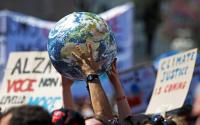9 December 2004Michael McCarthy, Environment Editor
The West's approach to fighting global warming, enshrined in the Kyoto protocol, will not work, a leading climate scientist said yesterday.
The struggle by developed countries to cut back their emissions of carbon dioxide (CO2), the principal greenhouse gas, will always be overtaken by the rising new emissions of the developing nations, led by China and India, who are not parties to the Kyoto treaty, said Professor Wallace Broecker of Columbia University, New York.
Only radical new technologies for extracting carbon dioxide directly from the air would halt global warming, said the professor, who is regarded as one of the fathers of climate change studies.
Dr Broecker gave a blunt verdict on the effectiveness of the Kyoto treaty, on which Tony Blair is staking huge political capital next year, when Britain will chair both the EU and the G8 group of rich nations and try to put climate change at the top of the international agenda.
He said: "What you guys are tinkering around with in Kyoto is just a drop in the bucket."
His view will be more unwelcome news for Mr Blair, who admitted yesterday that the Government's target for reducing CO2 emissions by 20 per cent by 2010 was likely to be missed by a large margin, although the Kyoto target is likely to be met.
Dr Broecker's criticism of Kyoto centres on the fact that the treaty only commits the rich industrialised countries of the West to cut carbon emissions. The developing nations, led by China and India, are not yet required to do anything. Their burgeoning economic development is largely being powered by coal and other fossil fuels, and the CO2 emissions that this produces will far outweigh the cuts of all the West's energy conservation and alternative energy schemes, he said. Extracting CO2 direct from the air, liquefying it and then storing it, he said, offered the only realistic hope of preventing climate change that would be catastrophic for the world. It was a practical solution and he believed it could be done without excessive cost.
"Alternative energy, and energy conservation ... are going to fall far short of stopping the build-up of CO2," he said. "But extracting CO2 direct from the air can do the job."
Dr Broecker, 73, professor of geology at Columbia's Lamont-Doherty Earth Observatory, is the world's leading interpreter of the Earth's operation as a linked biological, chemical and physical system. In the 1980s, he identified the world-wide "conveyor belt" of ocean currents which plays a key role in regulating the planet's climate. The shutting-down of this conveyor belt by global warming - which then led paradoxically to a new Ice Age in the northern hemisphere - was the subject of the Hollywood disaster film The Day After Tomorrow.
In July 1987 he set out his fears in a celebrated paper in Nature, "Unpleasant Surprises in the Greenhouse?", which was perhaps the first widely noticed sounding of the global warming alarm.
* Speculation Britain is seeking to win George Bush's backing for a new treaty on global warming rose last night after it emerged Tony Blair held talks in Downing Street with John McCain, the Republican senator, on the subject. One possibility is the US would sign up to a "Kyoto-lite" deal that would investigate the scale of the problem of climate change.
http://news.independent.co.uk/low_res/story.jsp?story=591190&host=3&dir=507






